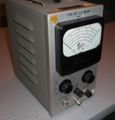130: Difference between revisions
m (-) |
No edit summary |
||
| Line 16: | Line 16: | ||
File:Tek 130 early.jpg|Early (Brown Era) Type 130 | File:Tek 130 early.jpg|Early (Brown Era) Type 130 | ||
File:Tek 130 early2.jpg|Early (Brown Era) Type 130 | File:Tek 130 early2.jpg|Early (Brown Era) Type 130 | ||
File:Martin 130 01.jpg | |||
File:Martin 130 02.jpg | |||
File:Martin 130 03.jpg | |||
File:Martin 130 04.jpg | |||
File:Martin 130 05.jpg | |||
File:Martin 130 06.jpg | |||
File:Martin 130 07.jpg | |||
File:Martin 130 08.jpg | |||
File:Martin 130 09.jpg | |||
File:Martin 130 10.jpg | |||
File:Martin 130 11.jpg | |||
</gallery> | </gallery> | ||
[[Category:LCR meters]] | [[Category:LCR meters]] | ||
Revision as of 07:27, 8 December 2014
The Tektronix Type 130 is a self-contained instrument that measures inductance and capacitance. When measuring inductance, the 130 makes an LC oscillator using the device (inductance) under test and a capacitor internal to the 130. When measuring capacitance, the 130 makes an LC oscillator using the device (capacitance) under test and an inductor internal to the 130. The frequency of the resulting LC oscillator is measured by mixing it down using a fixed reference frequency, generating a pulse at each zero-crossing, and integrating (low-pass filtering) the pulse train. This produces a voltage that is proportional to the frequency difference between the LC oscillator and the reference oscillator. This voltage is displayed on a d'Arsonval meter on the front panel of the 130.
The Type 130 was designed by Cliff Moulton.
-
Early (Brown Era) Type 130
-
Early (Brown Era) Type 130
-
-
-
-
-
-
-
-
-
-
-












